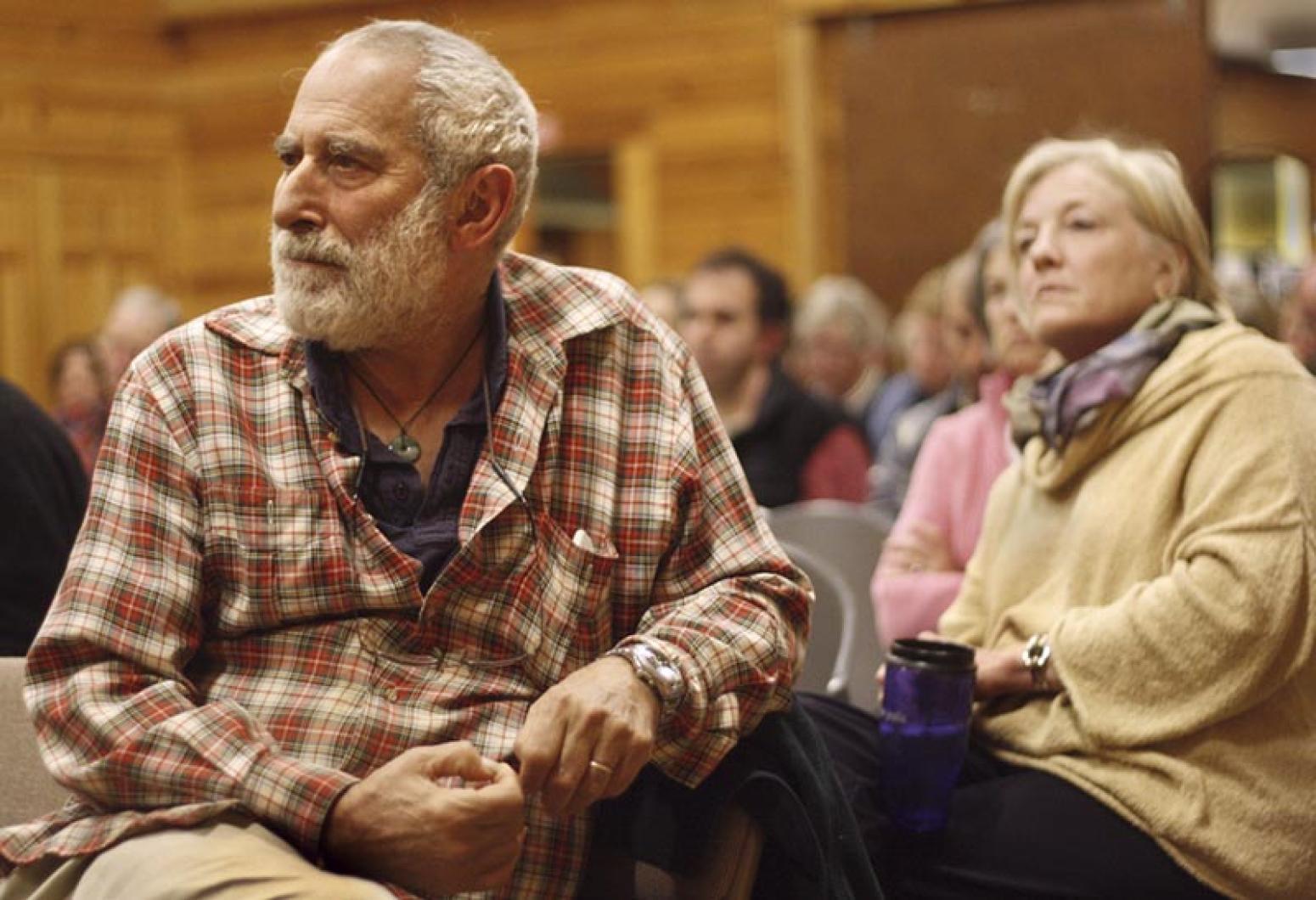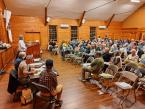Despite the small size of the crowd, the debate among Chilmark voters at their annual town meeting this week was passionate and at times heated.
On Monday night voters gathered at the Chilmark Community Center to take up a 27-article warrant. Moderator Everett H. Poole presided.
A total of 113 voters attended, well over the quorum requirement of 25.
It was a meeting which saw a rare moment when Mr. Poole laid aside his gavel for the third time in his 31-year career to speak from the floor.
The subject was a plan by the U.S. Coast Guard to build a new tower on Peaked Hill. The tower, which will stand at 100 feet and be topped with a 13-foot antennae, is part of Rescue 21, a nationwide maritime 911 system for coastal waters intended to replace outdated technology.
The project drew heated and lengthy debate.
And even the normally taciturn Mr. Poole was moved to speak.
“I am an ex-Coast Guardsman also and I think this program is fantastic,” he said, adding: “We need it. The whole coast needs it. We don’t want to be the one place that holds it up.” In the end other voters agreed and the tower was approved.
The meeting began with a standing ovation for town constable Daniel Bryant who, after 27 years, has stepped down as the head of civil defense and later emergency management in Chilmark. Mr. Bryant will continue to serve as constable.
Voters approved a $6.7 million operating budget for the coming fiscal year with little discussion. The budget marks an increase of $500,000, or 8.4 per cent, over last year.
Included in the budget are three separate overrides to Proposition 2 1/2, the state law which limits the annual increase in a community’s tax levy to 2.5 per cent. An increase of some $450,000 in education expenses is the main reason for the override. Education spending will increase 24 per cent overall this year. The increase can be tracked to a rise in the number of Chilmark students in the public school system.
At the annual town election on Wednesday voters approved all three override requests, including one to spend an additional $78,000 on education. They also agreed to spend $5,600 to fund the Dukes County pest control program and $7,200 to fund the county health care access program.
The town meeting lasted four minutes shy of three hours, with the Coast Guard antennae item last on the warrant. Members of the Coast Guard attended the meeting to support the new tower, which would replace the existing 48-foot public safety antennae now on Peaked Hill. Selectman and board chairman Warren Doty introduced the article. “I have great respect for the Rescue 21 project. It’s a terrific advancement in search and rescue,” he said.
But Mr. Doty said he had reservations about the project.
Peaked Hill is a half-acre property owned by the Vineyard Open Land Foundation and protected by town conservation restrictions. Two properties, one owned by the Martha’s Vineyard Land Bank and the other by the town, border the site. A network of walking trails connects the three properties.
“This is a property with complete public access, not just for Chilmark residents, but for everyone who lives on Martha’s Vineyard,” Mr. Doty said.
Some voters echoed his concern. “It is a great idea to have public safety, it’s a terrible idea what it’s going to look like,” said Arlan Wise.
“Does it have to be on the Vineyard?” Dan Greenbaum asked. “Can’t we wait a little bit and know the answers? We really ought to know that before we give up our jewel of Peaked Hill.”
Mr. Doty suggested that the Coast Guard study alternative locations for the tower, such as the capped landfill on Tabor House Road, the water tower in Edgartown, or near the Park and Ride in Vineyard Haven, and return to Chilmark during a special town meeting in September with the results.
But other voters saw no need for delay. “As a sailor, I owe a big debt to the Coast Guard,” said Steve Lewenberg, a member of the town personnel board. Mr. Lewenberg pointed to the town seal, which depicts a sailboat. “It’s important to collaborate with the Coast Guard and let them do what they need to do to ensure our safety,” he said.
Thomas A. Tansey, Rescue 21 environmental manager, offered some explanation. “It will be a simple, straight, plain pole with a whip antennae. It will not look like a cell tower,” he told the divided crowd. “The Coast Guard did look at every other place on Martha’s Vineyard last summer,” he added.
He said other locations were not as tall as Peaked Hill, which at 311 feet, is the highest point on the Vineyard. Interference from other communication systems and trees also ruled out alternative sites. Mr. Tansey said the Coast Guard plans to begin construction on the site in the fall and hopes the tower will be operational the following year.
Plans for the project also include replacing an existing fiberglass hut with a larger one made of concrete and shielding the area with trees and shrubs. The project will cost the Coast Guard $800,000. Chilmark and Dukes County, which houses equipment at the site, will be asked to contribute up to an additional $20,000.
“What’s wrong with being proud that the Coast Guard wants to put up something that is going to save our lives,” asked Jane Slater. “I don’t know how you can sit here with fishermen in your audience and delay for six months something that will save their lives.”
Harbor master Dennis Jason, a former member of the Coast Guard, voiced support for the project as did selectman J. B. Riggs Parker, a recreational boater and ham radio operator. “It’s human life on the one hand and not in my back yard on the other,” Mr. Jason said.
Mr. Poole, who had stepped down from his lectern to comment, agreed. “If they want that tower on Peaked Hill, that’s where it ought to go,” he said.
Following the public discourse, Mr. Doty returned to the microphone with a changed opinion. “If we can work out the landscaping, I think Rescue 21 is a good plan,” he said, then listing requests, including that the Coast Guard paint the pole gray and repair the access road. “I think you’ve shown us there really is no alternative site,” he told Mr. Tansey.
And the article was approved.
A request to amend town zoning bylaws for a new wireless communication system also drew debate. “Could someone explain why we need this,” asked Edward Miller.
“It is a bylaw that will enable us to keep up with technology over a period of time,” explained Mr. Parker. He said the proposed bylaw amendment, which ran for nearly five pages in the warrant, would create a board with the authority to grant special permits for the installation of antenna in town.
In February, Chilmark, Aquinnah and West Tisbury selectmen signed a memorandum of understanding to share the cost of installing a distributed antennae system (DAS), a network of small antennas set atop existing telephone poles or other poles. The system is aimed at improving cellular telephone service up-Island.
Some voters asked about the health detriments such a system could cause. “We get more damage from holding the cell phone to our ears than from the DAS system,” Mr. Parker said. Others hesitated to give a newly created board the final say on antennae installations. “I have a problem creating a commission that doesn’t come back to town meeting. I think it’s very undemocratic,” said Jonathan Mayhew, a former selectman. Mr. Mayhew moved to amend the language to give town meeting the authority to grant the special permits. The amendment failed.
Mr. Doty moved to remove language which would have exempted the town of Chilmark from applying for a special permit to construct an antennae. “I don’t think the town should exempt itself from following its own bylaws,” he said. Voters agreed and the amendment carried.
In the end the article, which needed a two-thirds majority, passed easily.
Three articles concerning affordable housing were approved. Voters unanimously approved spending $60,000 in Community Preservation Act money to launch a mortgage assistance program. They also unanimously voted to spend $376,400 from Community Preservation Act funds to put in roads and utilities for the Middle Line Road affordable housing project, as well as $132,500 to install 10 wells for the project.
“These are the last of the major expenses to bring this project to fruition,” Mr. Doty said. Following the vote there was a round of applause for the project.
Voters also agreed to:
• Enlarge a garage door at the Cross Road fire station.
• Pay an outstanding bill from the previous year.
• Upgrade computer and communication systems for the police department.
• Dredge and replace pilings at Menemsha Basin.
• Replace computer software in town hall.
• Fund various community preservation projects ranging from the preservation of historic stone walls to the purchase of historic artifacts.
• Postpone replacing a freezer at the community center. The summer program committee will provide the money to buy the freezer.
Before the meeting adjourned, Mr. Doty invited the public to attend a discussion on a proposed wind turbine at the West Tisbury School with the selectmen on May 6 at 7:30 p.m. in town hall.
With that, Mr. Poole the moderator, back at the lectern, banged his gavel and adjourned the meeting.









Comments
Comment policy »